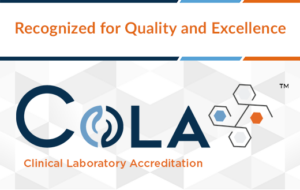 Sunflower Medical Group’s Patient Portal now allows you to review your lab results completed at our in house COLA certified laboratory as soon as they are available. With this change you may potentially see your lab results before your provider has fully reviewed your results. Please note that although a lab result may be marked abnormal/flagged “red” that it may not be considered clinically significant.
Sunflower Medical Group’s Patient Portal now allows you to review your lab results completed at our in house COLA certified laboratory as soon as they are available. With this change you may potentially see your lab results before your provider has fully reviewed your results. Please note that although a lab result may be marked abnormal/flagged “red” that it may not be considered clinically significant.
Below you will find a basic description of some of the most common labs done within our in house laboratory. Although these descriptions give a general idea of how these labs are utilized it is not meant for diagnostic purposes. Our providers review all lab results and if the labs are abnormal in a clinically significant way you will be contacted with further instructions.
Lipid Panel:
- Cholesterol: Measure of cardiac risk and stroke risk.
- Triglycerides: Diet and weight sensitive type of cholesterol easily affected by lifestyle changes.
- HDL: Considered the heart protective cholesterol and is responsive to aerobic activity and ideal weight.
- LDL: Considered the “bad cholesterol.” Treatment goals depend on how many cardiac risk factors you have.
Complete Blood Count (CBC):
- White blood cells: Infection and immune response cells.
- Hemoglobin/Hematocrit/Red Blood Cells: Indicators for anemia
- MCV/MCH: Size of your red blood cells and can indicate common deficiencies such as iron and vitamin b 12 deficiency
- Platelets: Clotting factors cells
- Neutrophils/Bands/Lymphocytes/Monocytes: White blood cells that fight different types of infections and can sometimes be elevated in inflammatory responses
- Eosinophils: White blood cells that are often involved in allergies and rarely parasites.
- Basophils: White blood cells that fight infections and are also involved in allergic reactions.
CMP (Comprehensive Metabolic Panel):
- Glucose: “Sugar level” primarily looking for diabetes.
- Urea Nitrogen (BUN): Measure of kidney function and may be elevated because of mild dehydration or because of excessive muscle breakdown from aggressive exercise habits.
- Creatinine: Measure of kidney function. It may be mildly elevated if you have particularly large muscle bulk or taking a supplement like creatine in addition to elevations due to kidney disease.
- Sodium: An electrolyte that may be abnormal because of dehydration, over-hydration, diuretics, as well as other medications.
- Potassium: An electrolyte that can cause muscular cramping or cardiac abnormalities. It can be abnormal for similar reasons as sodium levels.
- Chloride: An electrolyte that typically is only clinically significant if the other electrolytes are abnormal.
- CO2: CO2 is used to evaluate the pH status of a patient and to assist in evaluation of electrolytes. Mild abnormalities (high/low) are typically not clinically significant and may represent starvation, dehydration, emphysema, or other metabolic causes when blood was drawn.
- Calcium: This is not related to dietary intake of calcium. It may fluctuate based on protein levels in the body.
- Total protein: This looks at protein within the body.
- Albumin: May be elevated because of high levels of fitness and can be suppressed due to liver or kidney dysfunction.
- AST/ALT: Liver function tests. These may not be considered clinically significant for minor elevations less than 2-3 times the upper limits of normal.
- Alk Phos: Part of liver function. Alk Phos can also be associated with bone health in some cases.
- Total Bilirubin: Part of liver function
Other:
- Thyroid Stimulating Hormone (TSH): Indicator of thyroid function which regulates metabolism throughout the body. This is an inverse relationship so a high number actually presents a low thyroid or “hypothyroid”. Borderline/mild abnormalities may be monitored or additional testing with Free T4 may be needed to determine if treatment is needed.
- Prostate Specific Antigen (PSA):(Men only) Prostate cancer screening test. Normal levels based on age. A higher PSA result does not always cancer, but is also associated with prostate infections and benign prostate enlargement; may require further evaluation.
- Vitamin D: Vitamin D is made in the skin from the sunlight exposure and also absorbed by the body from dietary sources (eggs, mushrooms, and fish among others).
- CK: Muscle enzyme typically elevated in muscle breakdown or it may represent ongoing inflammation of the muscles.
- Magnesium: Electrolyte associated with muscle cramping or heart rhythm disturbances.
